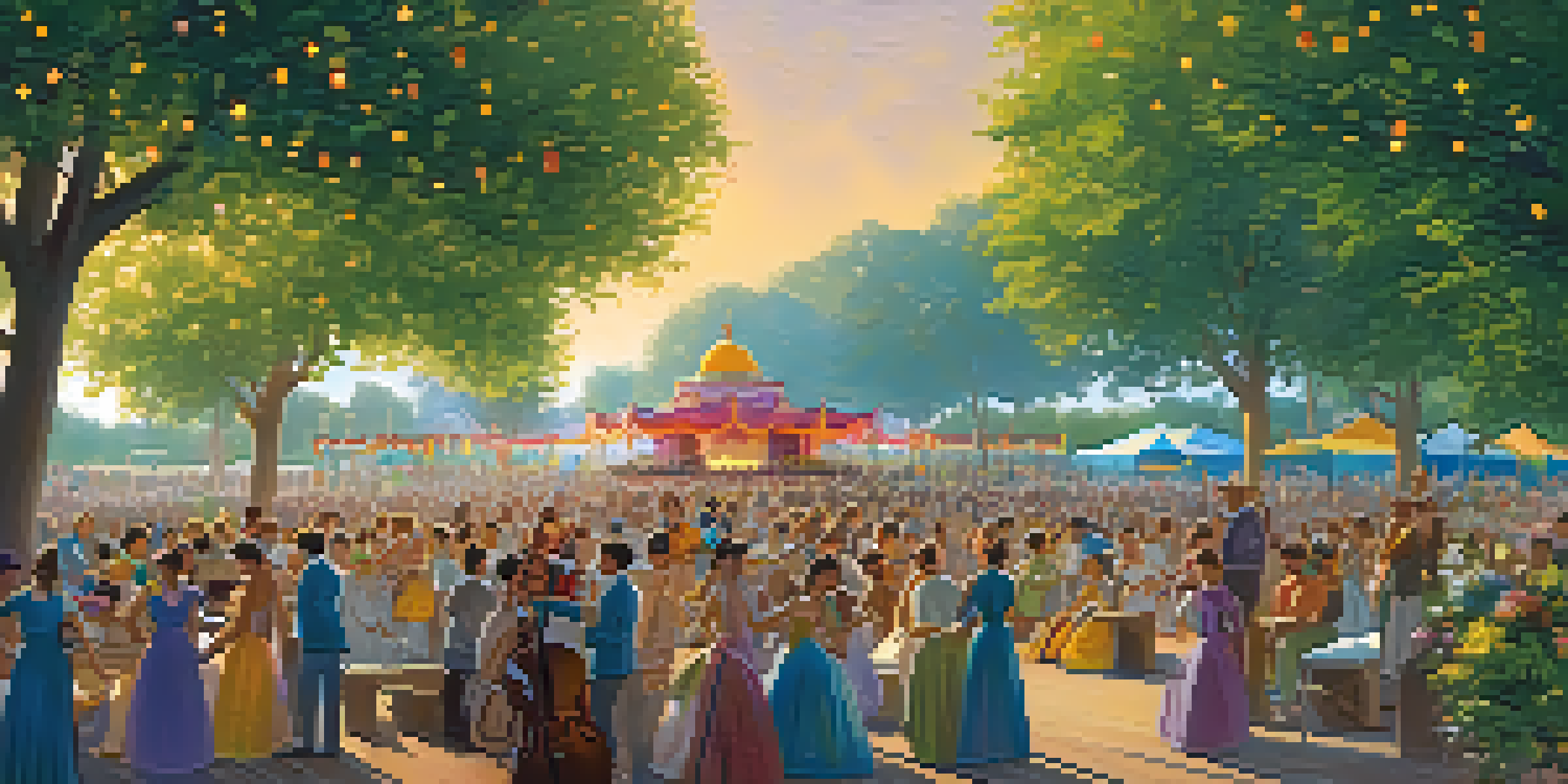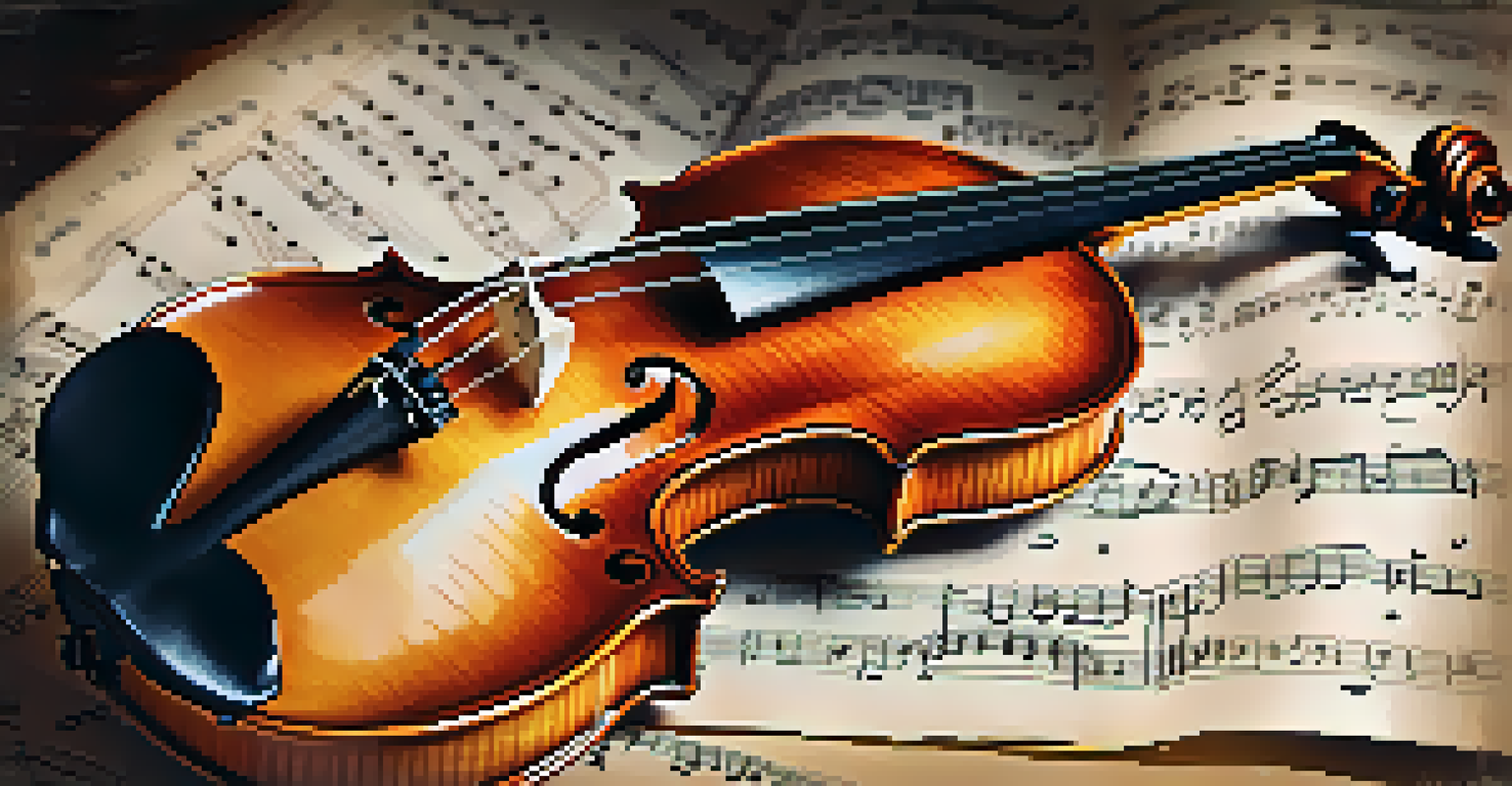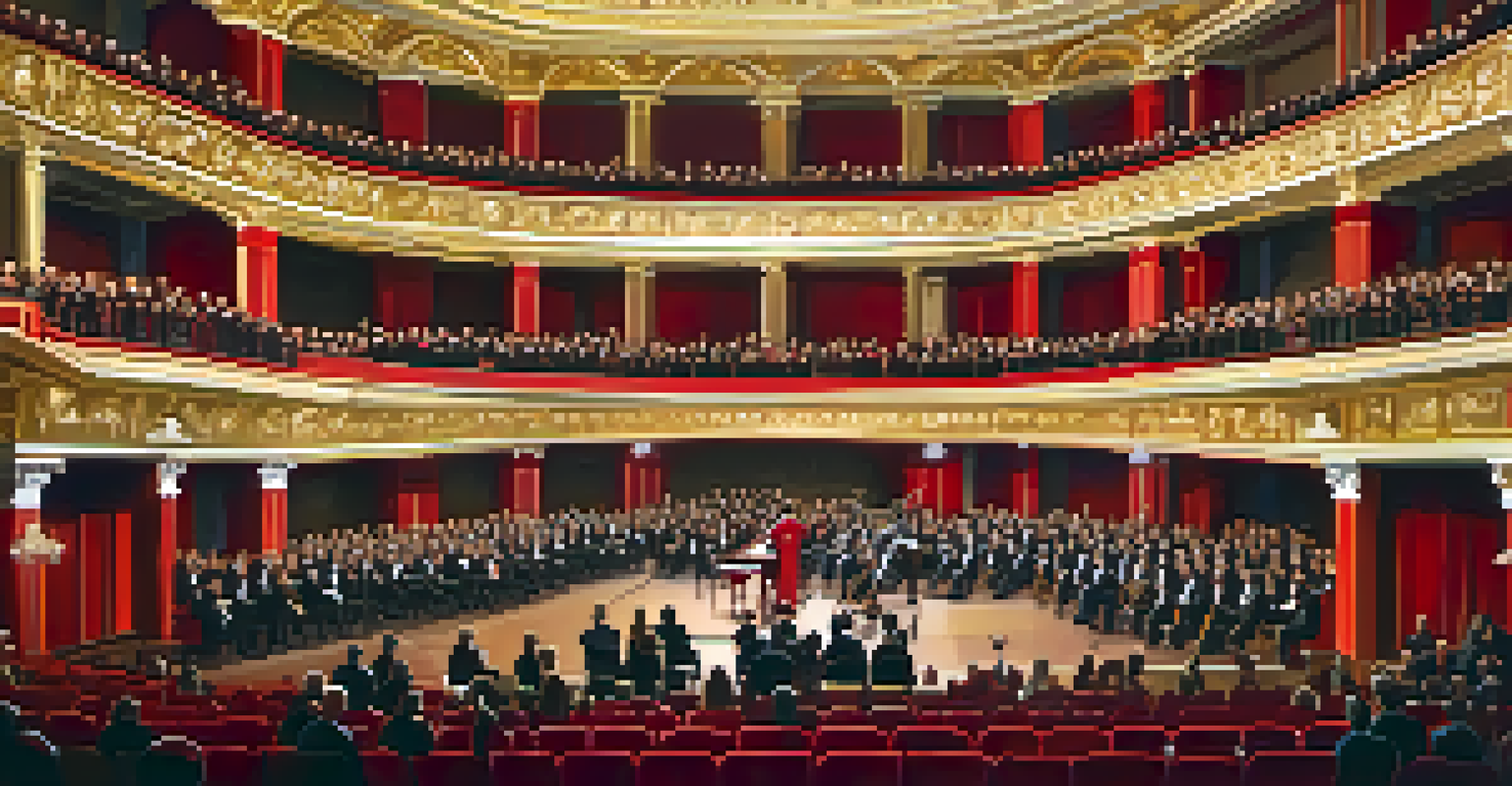The Evolution of Classical Music in Cultural Heritage

Classical Music: A Historical Overview
Classical music has deep roots that stretch back several centuries, evolving through various eras. Originating in the medieval period, it has transformed through the Renaissance, Baroque, Classical, Romantic, and contemporary styles. Each era brought distinct styles, techniques, and notable composers who contributed to its rich tapestry.
Music is the shorthand of emotion.
For instance, the Baroque era introduced complex polyphony and ornamentation, with composers like Bach and Vivaldi leading the way. In contrast, the Classical period focused on clarity and balance, exemplified by the works of Mozart and Haydn. Understanding these historical shifts helps us appreciate how classical music has continually adapted over time.
Today, classical music remains a living tradition, influencing and being influenced by contemporary genres. Its evolution mirrors societal changes, reflecting the cultural heritage from which it springs. This journey highlights the importance of classical music in shaping cultural identity across generations.
The Role of Classical Music in Cultural Heritage
Classical music is more than just notes on a page; it embodies the cultural values and historical narratives of its time. Each piece often tells a story or conveys emotions that resonate with the experiences of the society from which it originates. This connection to culture makes classical music a vital part of our shared human heritage.

For example, Beethoven’s symphonies not only showcase innovative musical techniques but also reflect the societal upheavals of his era. Similarly, nationalistic composers like Dvořák and Grieg drew inspiration from their folk traditions, weaving cultural identity into their compositions. These elements highlight how classical music serves as a cultural artifact, preserving the essence of a time and place.
Classical Music's Cultural Significance
Classical music serves as a vital cultural artifact, reflecting the values and narratives of the societies from which it originates.
As we delve into the past, we see how classical music has been used in rituals, ceremonies, and celebrations, anchoring communities to their roots. This cultural significance continues to inspire new generations, ensuring that classical music remains relevant in today's globalized world. Thus, it plays a crucial role in maintaining the continuity of cultural heritage.
Influence of Classical Music on Modern Genres
The impact of classical music stretches far beyond concert halls, influencing numerous modern genres. Elements of classical composition—such as orchestration, harmony, and structure—can be found in pop, rock, jazz, and even electronic music. This cross-pollination enriches contemporary soundscapes and introduces classical elements to new audiences.
Classical music is the kind we keep thinking will turn into a tune.
For instance, artists like Ludovico Einaudi and Max Richter have successfully blended classical music with modern sensibilities, creating atmospheric pieces that resonate with listeners today. Additionally, film scores often draw heavily from classical traditions, using orchestral arrangements to evoke emotion and enhance storytelling. This demonstrates how classical music continues to thrive in new contexts.
Moreover, modern musicians frequently sample classical works, creating a dialogue between the past and the present. By integrating classical music into their tracks, they not only pay homage to its legacy but also encourage a fresh appreciation among younger audiences. This interplay showcases the timeless nature of classical music and its ability to adapt.
The Preservation of Classical Music Heritage
Preserving classical music heritage is vital for future generations, ensuring that this rich tradition continues to thrive. Various organizations and institutions work tirelessly to archive recordings, manuscripts, and historical documents, safeguarding the legacy of classical composers. This preservation effort allows scholars and musicians to study and perform works that might otherwise fade into obscurity.
In addition to physical preservation, digital technology plays a significant role in making classical music accessible. Online platforms allow users to explore vast libraries of recordings and sheet music, breaking down barriers and democratizing access. This accessibility fosters a global appreciation for classical music, inviting diverse interpretations and performances.
Modern Influence of Classical Music
Elements of classical music have permeated modern genres, enriching contemporary soundscapes and expanding its reach to new audiences.
Furthermore, educational initiatives help instill a love for classical music in younger audiences. By introducing children to the beauty of classical compositions through interactive programs and performances, we cultivate a new generation of enthusiasts and practitioners. This ongoing commitment to preservation and education is essential for keeping the spirit of classical music alive.
Cultural Festivals Celebrating Classical Music
Cultural festivals dedicated to classical music serve as vibrant celebrations of this art form, bringing communities together. These events often feature performances by renowned orchestras, soloists, and ensembles, showcasing the diversity and richness of classical repertoire. Festivals create a unique atmosphere where music lovers can gather, share their passion, and deepen their appreciation for classical works.
One notable example is the Salzburg Festival in Austria, which has been attracting audiences since 1920. It features a wide array of classical performances, operas, and concerts, drawing visitors from around the world. Such festivals not only highlight the talent of performers but also contribute to local economies and tourism, demonstrating the cultural significance of classical music.
Moreover, these festivals often incorporate educational components, such as masterclasses and discussions with artists. This engagement fosters a deeper understanding of classical music's intricacies and invites participants to explore their creativity. Ultimately, cultural festivals play a crucial role in celebrating and sustaining classical music heritage.
Challenges Facing Classical Music Today
Despite its rich history and cultural significance, classical music faces several challenges in today's fast-paced world. One major issue is the declining audience numbers, as younger generations gravitate towards popular music genres. This shift can lead to concerns about the longevity of classical music and its relevance in contemporary culture.
Additionally, funding for classical music institutions and programs has become increasingly competitive. Many orchestras and opera companies rely on donations and grants, making it challenging to sustain operations and outreach initiatives. This financial strain can limit the accessibility of classical music, particularly for underserved communities.
Preservation for Future Generations
Efforts to preserve classical music heritage, including digital accessibility and educational initiatives, are crucial for maintaining its relevance and appreciation.
However, initiatives aimed at increasing engagement, such as innovative programming and community outreach, are helping to address these challenges. By adapting to modern tastes and leveraging technology, classical music organizations can reach new audiences and ensure their survival. Embracing change while honoring tradition is key to navigating the future of classical music.
The Future of Classical Music in Cultural Heritage
Looking ahead, the future of classical music in cultural heritage appears promising, thanks to ongoing innovations and outreach efforts. As artists continue to experiment with blending classical elements into various genres, the music remains dynamic and relevant. This evolution invites new listeners to appreciate classical music's depth and complexity, securing its place in modern culture.
Moreover, technology offers exciting opportunities for engagement and collaboration. Virtual concerts, interactive apps, and online educational resources are making classical music more accessible than ever. These advancements can help bridge the gap between traditional audiences and new generations, fostering a lasting connection to this art form.

Ultimately, the future of classical music depends on a collective commitment to preserving its heritage while embracing change. By valuing its historical significance and promoting inclusivity, we can ensure that classical music continues to inspire and enrich cultural heritage for years to come. This journey invites all of us to be a part of the ongoing story of classical music.